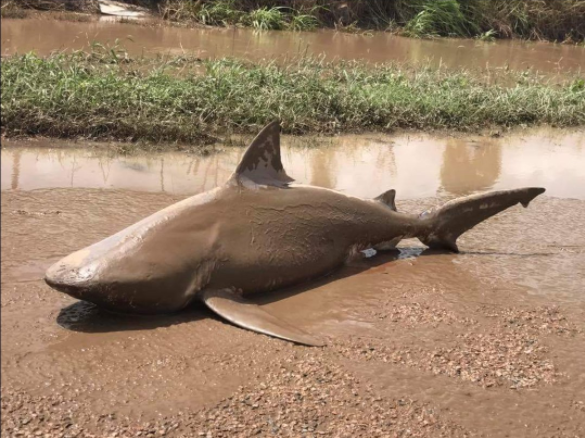
'Sharknado' Down Under? Cyclone Debbie Deposits Shark on a Street

Forget about the "Sharknado" film series. A town in Australia experienced a real-life shark-cyclone of sorts when a shark washed up on the street after Cyclone Debbie hit the area, according to news reports.
The tropical cyclone hit the Australian state of Queensland this week, with heavy rainfall causing flash flooding in some areas along the coast, according to NASA. The rotating storm reached maximum sustained wind speeds estimated at over 115 mph (185 km/h), NASA reports, and drenched the ground with more than 20 inches (50 centimeters) of rain along much of its route. (Such storms are called hurricanes when they form in the Atlantic and Northeast Pacific oceans.)
Cyclone Debbie also deposited a shark on a road in the town of Ayr, in the north Queensland region of Burdekin, Queensland Fire & Emergency Services tweeted on Thursday (March 30). [On the Brink: A Gallery of Wild Sharks]
The 5-foot-long (1.5 meters) bull shark was found dead in a floodwater puddle, reported News.com.au. Bull sharks are common in the area, according to local journalist Philip Calder, who told the news agency that bull sharks live in the small waterways like the nearby Burdekin River close to communities.
With the heavy rainfall from the cyclone, the Burdekin River rapidly reached a peak of 31 feet (9.5 m), rising more than 16 feet (5 m) in just 5 hours late Wednesday (March 29), Ash Ryder, senior firefighter at the Ayr Fire and Rescue station, told The Courier Mail.
"He must've gotten caught in a torrent and [gotten] confused, beached himself on the side of the road," Calder told News.com.au. "We were pretty amazed, we were turning up to shoot a flooding road, we weren't expecting to see wildlife as well."
Bull sharks will live in both freshwater and saltwater, John Carlson, a research biologist at the National Oceanic and Atmospheric Administration's Fisheries Service, previously told Live Science. They survive in freshwater by regulating the salt in their bodies, according to Carlson. Bull sharks have a special salt gland that keeps the salt concentration inside their bodies in balance with the concentration in the water — a process known as osmoregulation.
Sign up for the Live Science daily newsletter now
Get the world’s most fascinating discoveries delivered straight to your inbox.
Original article on Live Science.

Most Popular


